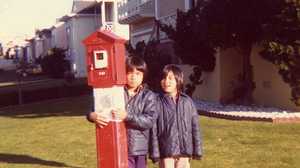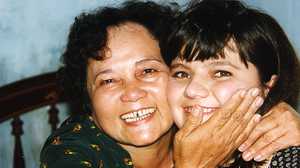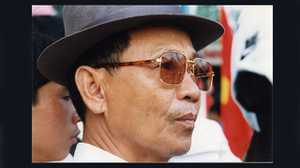Heidi Bub

Heidi Bub was named Mai Thi Hiep at her birth on December 10, 1968, in Danang in southern Vietnam. Her father was an American serviceman, while her mother, Mai Thi KIm, already had three children. Kim's husband, Do Huu Vinh, had left her to fight with the Viet Cong, forcing Kim to work at an American military base, where she met Heidi's father.
As the North Vietnamese Army approached Danang in March 1975, Kim feared for the safety of her mixed race daughter. She had heard rumors that the North Vietnamese would kill Amerasian children, and decided to send Hiep to the United States. On March 15, 1975, Kim left her six-year-old daughter at an orphanage operated by the Holt Adoption Agency.
Hiep left Vietnam on a plane that was part of Operation Babylift. Renamed Heidi, she was adopted by a single American woman, Ann Neville. The two of them lived in Columbia, South Carolina, for one year, before settling in Pulaski, Tennessee.
In Pulaski, Heidi joined the Girl Scouts, played softball, and learned to swim. She was baptized into the United Methodist Church, where she attended services, Sunday school, and United Methodist Youth Fellowship meetings. Heidi had many friends, and frequently invited them to slumber parties at her house.
Heidi was known as an excellent student. Her second grade teacher, Wanda Hamlett, said, "She was very good with her lessons and did all the nice little things that teachers really like."
Pulaski was an integrated community, where blacks and whites often formed friendships. Heidi said, "I never said I have black friends and white friends, I just had friends." Yet according to John Bub, Heidi's husband, the town still harbored some hidden racism. Pulaski is the birthplace of the Ku Klux Klan, the nation's most notorious racist organization. Bub says, "people try to keep that hush hush, they don't like that fact... Every year they fight the fact that the KKK wants to march on the anniversary; every year they march on the anniversary, downtown and all that."
As a child, Heidi was often asked by her playmates if she was Spanish or Indian, and she simply said no. "They really didn't push it," said Heidi. "So I was glad... They knew I wasn't white, but they didn't think anything of it."
In Pulaski, Heidi had no contact with Vietnamese people, or even other Asians. She had no exposure to Vietnamese language or culture. "Growing up I suppressed it all, because Ann wanted me to be 101 percent American -- not let anyone know. [She said] ...people weren't going to accept me."
Hamlett had been told that Heidi was part Vietnamese, but she did not believe Heidi's classmates knew. "I don't remember us telling the children," she said. Tancy Hughes, a close friend of Heidi's, thought she was originally from Pulaski, because they attended the same school. "I don't remember her telling me about being from Vietnam," said Hughes. "I guess I just knew about it."
Sam Collins was Heidi's eight grade science teacher. From 1963 to 1967, he had served in Vietnam with the Marine Corps. He said, "I knew about [Heidi's] background but I never said anything... because it was an experience I wasn't -- didn't really want to deal with."
Having Heidi in his class brought back Collins' own memories about his traumatic war experiences. He told Heidi, "I tried to mask those feelings because I did not want to hurt you in any way." At the same time, Collins wondered how much Heidi knew or understood about her own past, and did not wish to stir any painful memories for her. "I tried to find out as much about you as I could," he told her. "Because I had an affinity for you that you couldn't understand at the time."
On the surface all seemed good between Ann and Heidi. They traveled more frequently than most Pulaski families. Hughes remembers that they attended the Macy's Thanksgiving Day Parade in New York City one year. Whenever they went out of town to go shopping during the weekend, Heidi would always invite a friend or two along. Hughes said she never saw any signs of conflict between Heidi and Ann.
Heidi describes her adoptive mother as a cold, stern parent, who never gave her any affection. Ann used to say, "You don't cry. That's showing your weakness. And you never show people your weakness."
When she was a child, Heidi always woke up before Ann. She ate breakfast, got dressed, and left for school before Ann got out of bed. Ann spent most of the day working as a dean at Pulaski's Martin Methodist College. Ann rarely dated and had no real social life of her own. Heidi said, "I feel that was her intention in adopting me. To have somebody she can mold, to be a person she can have around for the rest of her life to share things with."
Once, when she was in high school, Heidi got a 'C' in geometry, for which she was grounded the entire summer. Ann allowed her to go to her lifeguarding job, but nowhere else. Many of Heidi's friends visited her while she was at work, including John Bub, whom she would later marry.
Like most girls in Pulaski, Heidi had to wait until she was 16 years old before she could date. "We dated on-and-off all through high school," said John. "On-and-off because her mother would ground her in between times."
After Heidi graduated from high school, Ann sent her to a women's college in North Carolina. Heidi would return to Pulaski every summer to work as a lifeguard. One night she went out on a date and returned home ten minutes after her curfew. She found a sign on the door that read, "This House Closes at 11:00." Because the door was bolted, Heidi could not enter, so she spent the night at a girlfriend's house.
When Heidi returned home the next day, Ann told her that she could follow her rules or leave.
"What do you mean, leave?" asked Heidi.
"Leave, you don't live here anymore," answered Ann.
When Heidi returned home on the following day, Ann had her bags waiting for her. "I could not believe she was doing this to me," said Heidi.
Ann never gave her a full explanation for throwing her out of the house. Heidi was devastated. After several years, her friend, Brenda Lewis, encouraged Heidi to begin a search for her birth mother. In 1991, Heidi's birth mother, Mai Thi Kim, had given a letter to an American official in Saigon asking for news of her daughter. The letter eventually was sent to the Holt Adoption Agency. Heidi found her birth mother's letter when she sought out her adoption records.
In 1997, Heidi returned to Vietnam, after a 22-year absence. She was accompanied by Tran Tuong Nhu, a journalist who served as her interpreter. Nhu was the first Vietnamese person Heidi had met since leaving Vietnam.
Heidi and Kim met each other at the Danang airport on March 22, 1997. Heidi and Nhu stayed at a hotel across the street from the family's house, where Kim lived with her husband, and Heidi's half-brother, Tinh, lived with his wife. Heidi's half-sisters, Hien and Lien, lived nearby with their families.
Heidi was immediately impressed with the affection among her family members. She said, "They may not have much here, but they do have love and unity. I'm kind of jealous of that." However, she soon found the affection overwhelming. Kim wanted to be with Heidi every minute, leaving her no time for rest or reflection. "There wasn't a minute for her to get away," said Tran.
Heidi had never been away from her husband and two daughters before. "It really opened my eyes to what a family means, and I want to be able to share it with them," she said. When Heidi called her husband, she was disturbed to learn that three-year-old Jessica and ten-month-old Caitlin were clinging to their father, and not sleeping well at night.
On the last day of Heidi's visit, Tinh asked Heidi if she would share some of the responsibility of caring for their mother. He asked if she could take Kim to the United States to live near her, or at least send a monthly stipend. Overwhelmed with anger by the request, Heidi answered that she could not.
Tinh said, "We don't want to force her... She's just come back for a visit. This is how things are done in Vietnam."
Heidi repeated that she could not fulfill their requests. She began to cry, and walked out. The family called Heidi back inside.
"On the anniversary of your departure, we treasure your return," said Vinh. "Although materially we're poor, our love for each other is rich."
"As your brother just said, don't give too much weight to what just happened," said Kim. "All I want is for you to be happy with our family. Since you've lived abroad for so long, your reaction is different. Life is different here. I understand, and I don't blame you."
"I don't know what to do!" said Heidi. "I wish I could have just kept the memories I had -- they were so happy.... I'm gonna leave with all these bad memories and all these bad feelings, and it's not how I wanted it to be."
"There's no more love," said Heidi. "It's just money money... and what I can do for them... It wasn't supposed to happen like this at all... But I know they don't have money. They can't expect me to instantly understand their way."
Heidi added that she had her own financial obligations. "I mean it took John and I months to save money for this ... they have no reality of the expenses we have... I mean we have bills and car payments and rent and utilities and I just can't think they can fathom how I can have so much money and not be rich... I don't know what it means to be rich."
Heidi explained her regrets to her family: "It breaks my heart to know your condition, and that I can't help you as I want to. Your expectations of me are more than I can handle and I wasn't prepared for it. I wish I could fulfill all your needs, but I will do what I can, and I just hope that it will be enough."
"We'll see each other again one day. Now I give you my address so you'll write a letter to me," Kim said as she handed Heidi a self-addressed envelope.
"Vietnamese, having been through the war and all this desperation, are very up front, especially about money," said Nhu. "They were pretty up front about that, and [Heidi] hadn't been brought up that way. So she might have wanted to do something for them, but she was highly insulted."
Kim told Nhu that she was hoping Heidi would be able to care for her tomb. "All the children are really obligated to care for their parents' tombs," said Nhu. "[Kim] was hoping in order to maintain the obligations to the ancestors that Heidi or somebody who was abroad -- because that's the person who has the most money -- would be able to contribute to that."
As of 2002, it remained emotionally difficult for Heidi to stay in touch with her family.
After Heidi's departure, her half-brother Tinh said, "The only thing I regret was that as a Vietnamese, I thought what I said was normal. But for an American, it was a shock. This is very common in Vietnam. In a family, if you're better off ... you might help out."
Heidi said that she agreed to do Daughter From Danang because she wanted to heal emotionally. She said that in spite of the misunderstandings, "I'm so thankful I got to meet my parents and the family." Whenever she watches the film, "it's like a piece that's coming together each time, and eventually the puzzle will be finished."







